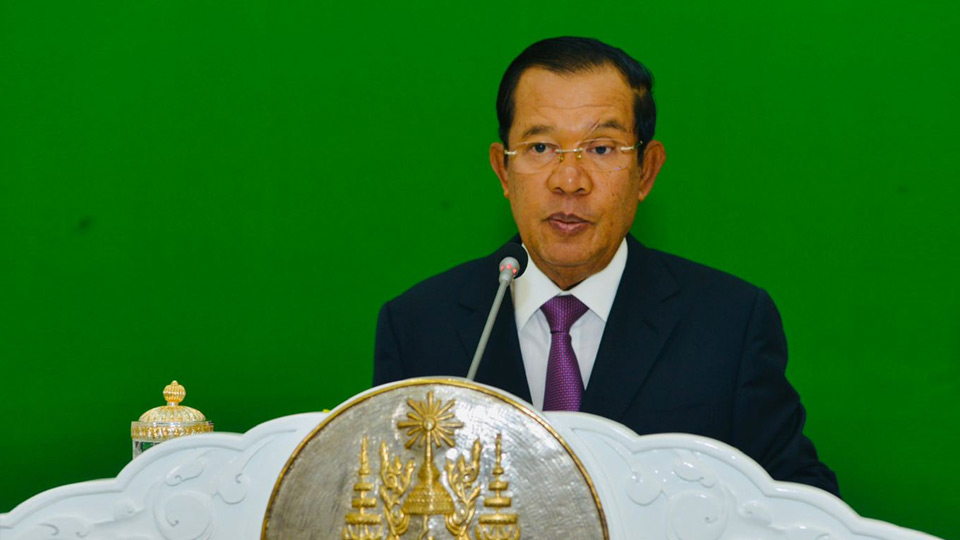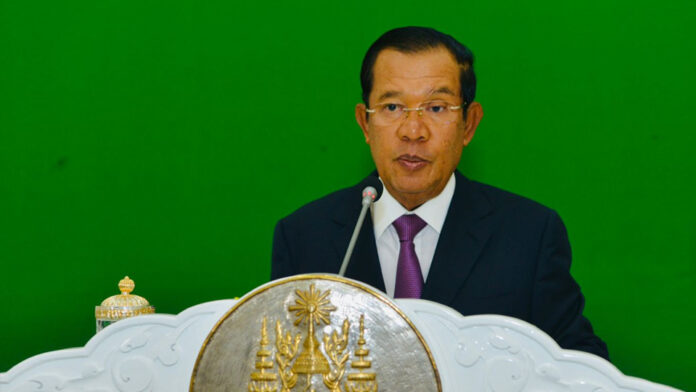- E. Li Yong, Director-General of the United Nations Industrial Development Organization;
- E. Suhail Mohamed Faraj Al Mazrouei, Minister of Energy and Infrastructure of the United Arab Emirates;
- Excellencies, Ladies, and Gentlemen!
 Today, I am pleased to attend the Global Manufacturing and Industrialization Summit 2020 ( GMIS 2020 ) under the topic “Restoring Prosperity in a Post Pandemic World” to share experiences and measures that the Royal Government of Cambodia (RGC) has taken to intervene and manage the socio-economic impacts caused by the COVID-19, as well as other specific policies aiming at restoring production and industry once the pandemic subsides and goes away in the near future.
Today, I am pleased to attend the Global Manufacturing and Industrialization Summit 2020 ( GMIS 2020 ) under the topic “Restoring Prosperity in a Post Pandemic World” to share experiences and measures that the Royal Government of Cambodia (RGC) has taken to intervene and manage the socio-economic impacts caused by the COVID-19, as well as other specific policies aiming at restoring production and industry once the pandemic subsides and goes away in the near future.
To begin, on behalf of the people and government of Cambodia, I would like to express my profound gratitude and sincere appreciation to the United Nations Industrial Development Organization (UNIDO) and the Ministry of Energy and Infrastructure of the United Arab Emirates for hosting this Summit. At the same time, I highly value the important and universal roles of UNIDO in contributing to the development of industrialization, innovation and technology, as well as the development and linkage of value chain, to promote economic growth in developing countries in the region and the world. Cambodia has so far had a number of cooperative programmes with UNIDO, especially the programme for country partnership 2018-2023, which bears fruitful outcome.
Excellencies, Ladies, and Gentlemen!
It has been nine months since the whole world has fought against the COVID-19 pandemic, which has created unprecedented crisis on societies and economies. Until now, despite impressive progress in vaccine development, there is no certainty of when the pandemic will end, and similarly, nobody can precisely estimate the impacts of the pandemic on all aspects of lives in each country. Socio-economic activities in most sectors have been affected, especially through measures that have been implemented to counter the spread of the pandemic such as lockdowns and travel restrictions.
In this context, global social norm is predicted to have structural change or may reach the “New Normal”, that includes: (1) the change in the global economic architecture such as the deterioration of the global and production chains; (2) the decline of global capital flows due to decrease in investment demands and human flows; (3) the drop in global productivity; and (4) the increase in social inequalities. At the same time, the COVID-19 has seriously hindered developments and the implementation of industrial and digital economy policies, in the context of the 4th Industrial Revolution (IR 4.0) in developing countries, especially in the least developed ones.
Nevertheless, the global economy is expected to recover on a gradual basis due to: (1) optimism on the discovery of vaccines or medicines for treatments, along with the capabilities of each country to adapt themselves to the pandemic; (2) various governments have considered removing or relaxing by phases their administrative measures that would allow economies to recover, aiming at helping businesses and people. Actually, Asian regions, particularly Southeast Asia and East Asia, that were among the first countries to be hit by the pandemic, have already stabilized the situation, reflected through the decline in transmission rate, the restoration of domestic economies such as production, consumption and international trade, as well as initiatives to revive tourism sectors and to strengthen regional production chains.
For Cambodia, the Royal Government has effectively kept the COVID-19 pandemic under control. As of now, Cambodia has not recorded any case of community transmission and never reached a stage requiring a partial or complete lockdown of the country. Nevertheless, the COVID-19 pandemic has indeed brought several critical challenges in sectors such as textile, tourism, aviation, and other service industries. In this regard, the Royal Government has released five rounds of measures, aiming at stabilizing productions and businesses that supply both domestic and overseas markets, and especially sustaining the livelihoods of those who have been severely affected. The intervention measures include tax relief schemes, exemption of Social Security fund contributions, credit relief schemes, liquidity expansion, wage subsidies for workers and employees working in the garment and tourism sectors, special financing schemes to help rehabilitate and promote small and medium enterprises (SMEs), skills training for affected workers and employees, and working capital financing program that helps meet the demands of factories, enterprises, and businesses within the country.
In the aspect of social intervention, the Royal Government has implemented the Cash for Work Program that will contribute to rural development and support farmers, through better community infrastructure and additional job opportunities during this challenging period. In addition, the Royal Government has implemented a cash-support program that provides temporary assistance to the poor and vulnerable people, in an effort to sustain their livelihood throughout the crisis. In the education sector, after being shut down for a period of time, the Royal Government has released “The Strategy on Reopening of Educational Institutions”, that requires educational institutions to implement mixed-learning methods, distance-learning through online systems and in-class learnings, through strict implementation of “social distancing” and other cautionary measures required by the Ministry of Health.
Looking forward, Cambodia will implement appropriate and timely interventions, combined with strategic considerations through the implementation of public finance policies, monetary policy, and structural reform measures, aiming at achieving two priorities: (1) stabilizing the socio-economic aspects by continuing the fight against the COVID-19 pandemic through increasing expenditures in the health sector and programs that promote public health, stabilizing business activities through provisions of incentives and tax reliefs, credit relief schemes, liquidity expansion, and sustaining the people’s livelihood and job opportunities through the Cash for Work Program, skills-upgrading and social assistance programs; and (2) promoting economic growth through strengthening Cambodia’s competitiveness, economic diversification and structural reforms.
Excellencies, Ladies, and Gentlemen!
Overall, to restore prosperity, we should altogether respond urgently and responsibly to overcome the challenging issues, along with fears that have been dividing up countries, through the implementation of pragmatic strategies and actions aiming at strengthening the value of peace, dignity and solidarity with equal footing and mutual respects, in order to achieve regional and global prosperity. In this sense, each country should play more active and interactive roles in global governance in a flexible, constructive and responsible manner, especially to contribute to the global orders in order to maintain peace and security, the key prerequisites for trades and long-term sustainable and prosperous growth for the whole world.
At the same time, we should continue strengthening the momentum of globalization, which has significantly contributed to economic growth and created unprecedented conditions that promote poverty reduction and livelihood of people from all walks of lives. Indeed, in the globalization trend, everything is connected and interconnected. In this context, we must ensure that our cooperative mechanism can maintain the spirit of open-mindedness and support for multilateral trade, by speeding up our social and economic interlinkages to support each country’s development in a sustainable and inclusive manner.
Excellencies, Ladies, and Gentlemen!
Despite the difficulties caused by the COVID-19 pandemic on socio-economic developments, the Royal Government has never slowed down its reforms in all sectors. In fact, the Royal Government has continually implemented in-depth reforms, aiming at solving the challenges being faced by investors and businessmen, in order to enhance Cambodia’s competitiveness through easing and creating a favourable environment for businesses and investments in Cambodia. In addition, in order to capture at maximum the opportunities of IR 4.0, the Royal Government has formulated Digital Economy Policies and e-Government Frameworks. In this context, I am happy to recall that during the visit of H.E. Li Yong, Director-General of UNIDO, to Cambodia in 2017, a Joint-Declaration on a “Programme for Country Partnership for 2018-2023” was signed in order to encourage industrialization in Cambodia, wherein the current circumstances, we expects this Programme for Country Partnership to play an important role in supporting Cambodia’s economic recovery in the post-COVID-19 crisis.
Before closing this remark, I would like to highlight that Cambodia is well-prepared to work closely with UNIDO and other development partners, both bilaterally and multilaterally, in enhancing industrial development and promoting global prosperity.
Finally, I wish H.E. Li Yong, Director-General of UNIDO, H.E. Minister of the Ministry of Energy and Infrastructure of the United Arab Emirates, Excellencies, Ladies and Gentlemen, good health and successes in all endeavours.
Thank you for your attention!



![(video) Selected Comments of Samdech Thipadei Hun Manet. at the friendly football match to celebrate the 29-December “Peace Day in Cambodia” [Unofficial Translations]](https://pressocm.gov.kh/wp-content/uploads/2025/01/SP-2024-12-29-17-48-09-0-324x235.jpg)
![(video) Selected Comments of Samdech Thipadei Hun Manet. at the presenting of certificates and diplomas to the students and fellows of the University of Human Resources [Unofficial Translations]](https://pressocm.gov.kh/wp-content/uploads/2025/01/SP_2024-12-26_09-41-19-100x70.jpg)
![(video) Selected Comments of Samdech Thipadei Hun Manet. the meeting with top students’ graduation of the secondary school exams and the level-3 technical and vocational exams [Unofficial Translations]](https://pressocm.gov.kh/wp-content/uploads/2025/01/SP-2024-12-23-09-23-08-5-100x70.jpg)
![(video) Selected Comments of Samdech Thipadei Hun Manet. at the declaration of Kampong Cham as the first province to have completed systematic land surveying and land titles distribution [Unofficial Translation]](https://pressocm.gov.kh/wp-content/uploads/2025/01/SP-2024-12-21-10-32-13-2-100x70.jpg)
